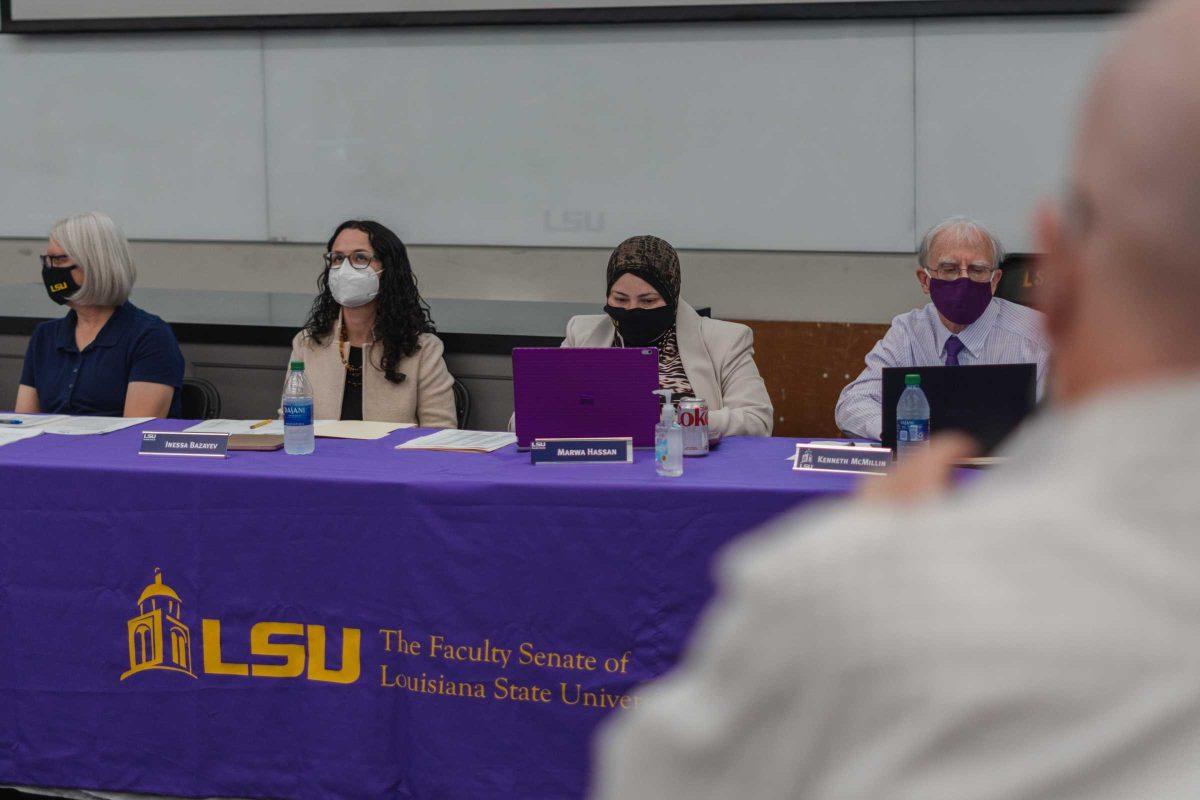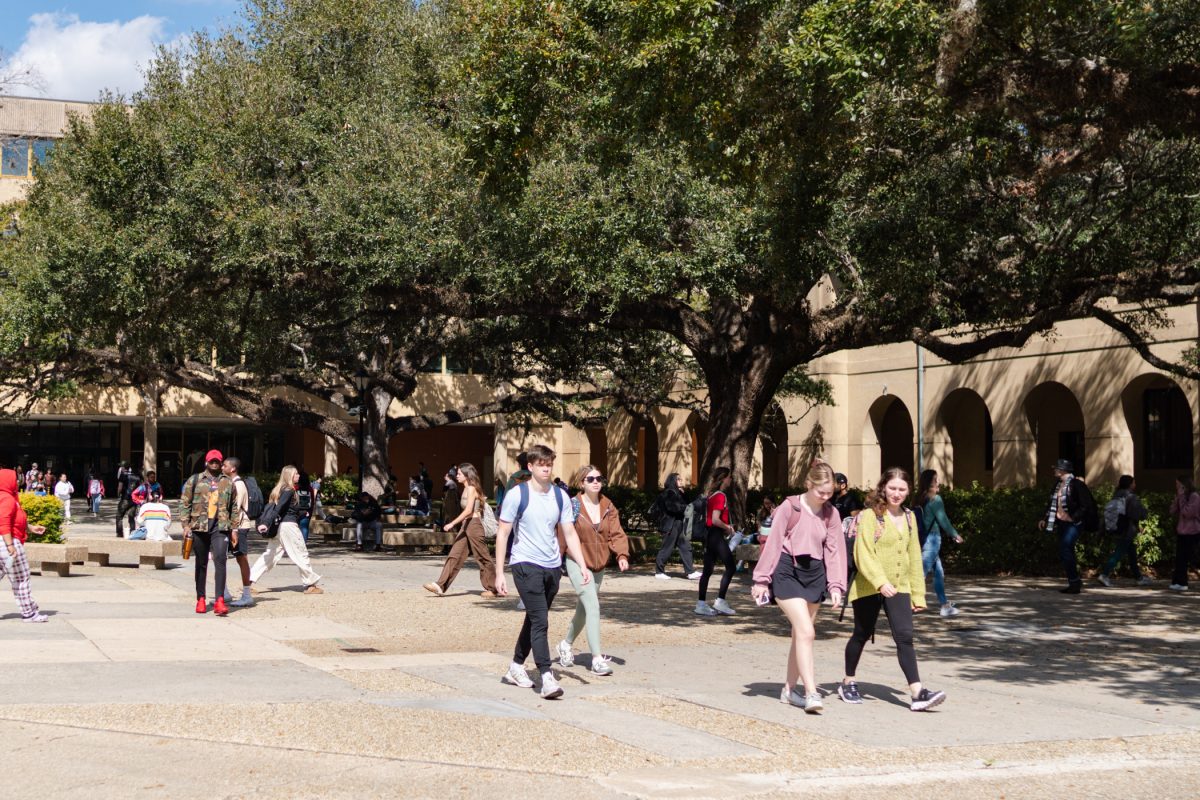LSU Faculty Senate leadership kicked out non-members of a public meeting Monday, including a Reveille reporter, without following proper protocols to go into executive session, which allows public bodies to speak in private under certain circumstances.
Following public comments and a short speech from LSU Board of Supervisors Chair Remy Starns, math professor Charles Delzell motioned for the Senate to go into executive session to discuss a resolution that involved “personnel matters.”
LSU Faculty Senate is a public body subject to Louisiana’s open meetings law, which states plainly:
“A public body may hold executive sessions upon an affirmative vote, taken at an open meeting for which notice has been given pursuant to R.S. 42:19, of two-thirds of its constituent members present. An executive session shall be limited to matters allowed to be exempted from discussion at open meetings by R.S. 42:17; however, no final or binding action shall be taken during an executive session.”
Those protocols weren’t followed. After Delzell’s motion, Faculty Senate President Mandi Lopez asked if there was opposition to moving into executive session, not an affirmative public vote, and asked non-members to leave.
“Going into executive session without taking a vote is illegal,” said attorney Scott Sternberg.
Non-members, including parents and students, waited outside the meeting room for 25 minutes. Mass communication professor Bob Mann told faculty leadership they were acting illegally and waited outside with non-members in protest.
“There’s no question in my mind that we’re breaking the law,” Mann said in an audio recording he took after the session closed. “Because we’re not debating any personnel, there’s no personnel that’s on this resolution. We are debating no confidence in an officer, so there’s no personnel to discuss here. I’m leaving. I’m not staying. I’m not breaking the law. This meeting is illegal.”
The resolution in question, which called for the resignation of Faculty Senate President Mandi Lopez, Vice President Joan King and Past President Ken McMillin, was due for its second reading. It was discussed in public during the Faculty Senate meeting Oct. 28.
Emails circulated at that meeting showing the three knew about the LSU Board of Supervisors’ plans to abolish one of the faculty’s governing bodies, but did not alert the rest of the faculty.
“The LSU Faculty Senate is certainly a public body within the meaning of Louisiana’s Open Meetings Law,” said Denver Nicks, a student attorney at Tulane University’s First Amendment Law Clinic. “In order to go into executive session, they must be in an open meeting, with a quorum, and take a public vote on going into executive session in which the vote of each member is recorded and the reason for going into executive session is publicly stated.”
Lopez only asked if anyone attending the meeting objected. She counted six people’s hands in the room and then asked non-members to leave.
Daniel Tirone, a political science professor, was present for the closed-door portion of the meeting. He said that most of the time was spent arguing about whether the decision to expel the public was appropriate.
“After everyone left, there was discussion about whether we had executed that appropriately,” Tirone said. “And also whether it was appropriate for us, even if the vote had been conducted in the right manner, about whether this was a sufficient reason to enter into executive session.”
Tirone said that the Senate decided to hold off the discussion on the no confidence resolution until they determined the appropriateness of the executive session.
Lopez declined to comment on the appropriateness of the executive session, and said that she would be seeking legal counsel on the subject.
Ravi Rau, a physics professor, said that the move to go into executive session was inappropriate, and that criticism of officers in an open way should not be so shielded.
Charles Delzell, who sponsored the motion, said he did not do a good job of explaining his reasoning at the meeting.
“I did a poor job due to lack of preparation of explaining my motion to go into executive session,” he said.
Delzell is not an elected member of the Faculty Senate. He was acting as an alternate for Scott Baldridge, who was not available for the meeting. Delzell said Baldridge will retake his place in the senate at the next meeting on Dec. 7.
Inessa Bazayev, a music professor and an at-large member of the Faculty Senate Executive Committee, expressed her disappointment in the decision to go into executive session.
“I value academic freedom and transparency, and I don’t think that it was appropriate for us to go into an executive session on a no-confidence resolution,” Bazayev said. “I was also concerned that the vote to go into an executive session wasn’t properly recorded.”
LSU journalism faculty condemned the Faculty Senate’s actions in a letter signed by 13 faculty members, including Mann and two former Manship deans, sent Wednesday afternoon.
“We the journalism faculty of LSU’s Manship School of Mass Communication condemn the Faculty Senate’s expulsion of a student reporter and members of the public from a crucial Senate meeting Monday,” the letter read. “The reporter, from the Reveille student newspaper, was the only journalist present. The Senate failed its ethical obligation to set a good example for students when it endorsed doing the public’s business secretly.”
The letter continued, saying, “Despite the Senate’s blatant move to avoid transparency, we will continue to teach future journalists that they, as representatives of the public, deserve access when state-funded institutions make important decisions.”
Faculty Senate enters unlawful executive session during meeting, kicks out non-Senate members
November 17, 2021
Members of the LSU Faculty Senate Executive Committee listen to the speaker on Monday, Nov. 15, 2021, during the LSU Faculty Senate meeting in the Howe-Russell Geoscience Complex in Baton Rouge, La.








